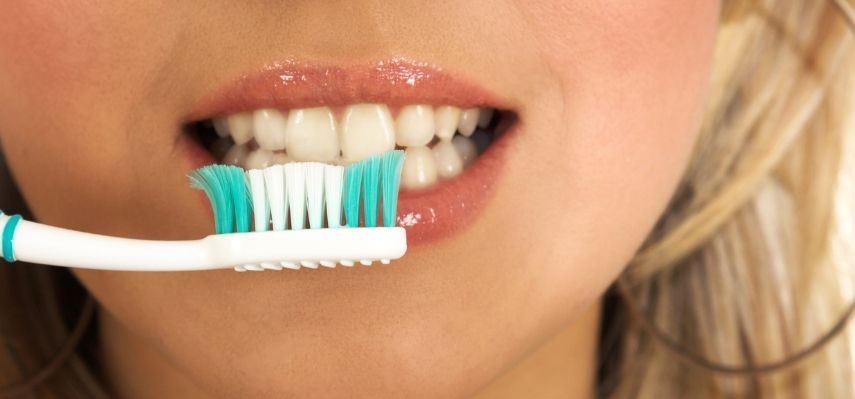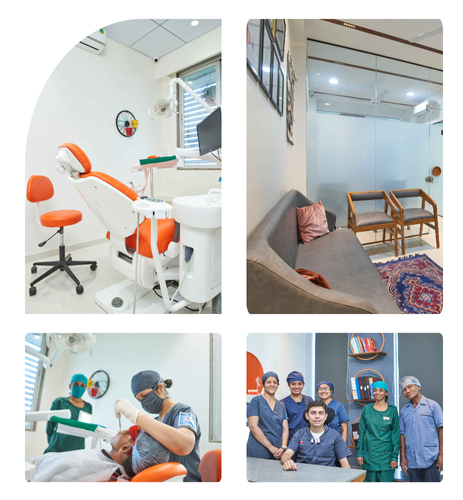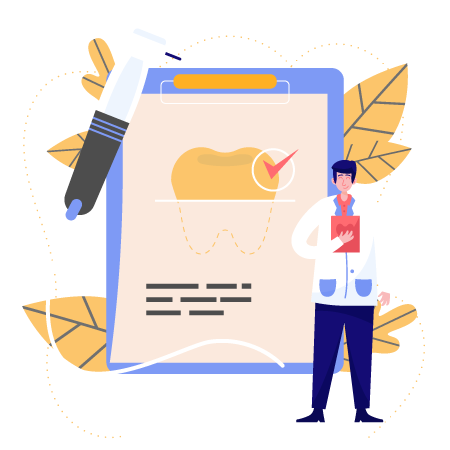
Brushing seems simple but very few of us brush our teeth ideally. Common mistakes and ways to fix them are mentioned below.
1) Choosing the wrong brush.
You only need a brush to loosen food particles stuck between your teeth. It is very important that you reach every corner of your mouth with your toothbrush. The bristles in the brush should be soft or extra soft and able to bend to ensure proper cleaning of the gums.
The belief that hard bristles clean teeth better is not true. Brushes with medium or hard bristles, used with force, can remove the protective layer of your teeth - enamel and damage the gums. This can result in sensitivity to cold drinks.
2) Using the toothbrush for too long
The average life of a toothbrush with constant use (twice a day for seven days a week) is about three months. Due to daily use, bacteria and food particles start to accumulate on the toothbrush. The bristles become worn and lose their elasticity, making them unable to clean teeth. You need to replace your brush after getting sick or after about 200 uses.
3) Brushing teeth for insufficient time
At least two minutes is the recommended time to brush your teeth. The average person brushes for only 45 seconds, which is not enough time for fluoride to bind to tooth enamel. For this, I recommend using an electric toothbrush with a clock or timer.
4) Brush your teeth immediately after eating and eat immediately after brushing your teeth.
After eating, the pH level in your mouth drops and your saliva is more acidic. Brushing at that time is like rubbing acid on the enamel on your teeth. Also, to maintain the effectiveness of the fluoride in toothpaste, you should maintain a gap of at least 30 minutes between brushing your teeth and eating.
5) Using the wrong brushing technique
Side-to-side strokes can break the soft tissue connection between your teeth and gums. Brushing too hard like this can lead to pitting and irritation in your teeth.
The correct way to brush your teeth is in a circular motion. The highest concentration of bacteria resides near the junction of the gums and teeth. Therefore, for thorough cleaning, the brush should contact both the teeth and gums and use a light touch. To clean the back of the upper and lower teeth, tilt the brush vertically and use light rolling strokes. For the most effective cleaning, the brush should be held at a 45-degree angle to the teeth.
6) You don't look in the mirror while brushing.
Just imagine, if you have to remove dirt from a corner, will it be easy to remove it without looking? No, it is not possible! Then how will you clean the germs on the gums and teeth that are not even visible without looking? Multitasking is a great way to do two things poorly. You need to look in the mirror while brushing. Make sure you clean all your teeth, all sides of the teeth and gums.
7) Brushing teeth more than twice a day
Brushing more than twice a day can damage your gums and wear away the enamel on your teeth. However, those who insist on cleanliness can use a water flosser after eating.
8) Storing your toothbrush in the bathroom
We're all guilty of making this mistake. A recent study found traces of human feces on toothbrushes stored in the bathroom. How did it get there? The contents of your toilet are released into the air when you flush. This is all the more relevant if you share your bathroom with other people - especially children.
Keeping your toothbrush covered can help reduce this problem. Consider storing your toothbrush somewhere other than your bathroom. Wash your toothbrush thoroughly before using it, and don't forget to close the lid on your toilet seat before flushing.
9) Rinse more after brushing your teeth
You can spit out the toothpaste, but don't rinse your mouth with water after brushing your teeth. This will reduce the effectiveness of the fluoride in your toothpaste.
10) Daily use of mouthwash
Like most toothpastes, some mouthwashes contain sodium lauryl sulfate, which is a cleansing and effective ingredient. However, since it is a source of sodium, ingesting it is not good for someone on a high-sodium diet.
Most mouthwashes are antiseptic. Some of the bacteria in your mouth are harmful, but there are also good bacteria that limit the growth of bad bacteria and help protect the body. Killing all the bacteria in your mouth as part of your daily hygiene is not the best idea. In addition, it increases the risk of developing resistance to antibiotics.
Third, for most people, there is no medical reason to use mouthwash. People think it will improve their breath. But if bad breath doesn't resolve with brushing and tongue cleaning, you really need to see your dentist. Don't use mouthwash like you spray perfume in the bathroom. For many people, bad breath can also be caused by tonsillitis, pyorrhea, some underlying disease, or infection.
Avoid using over-the-counter antiseptic mouthwash regularly. A mixture of warm water and salt is usually one of the best and most free mouthwashes.
11) Laziness in using dental floss
Flossing is essential at least once a day to remove germs between your teeth where a toothbrush can't reach. Set up a system so you can get into those hard-to-reach areas between your teeth. I always floss after eating. If you find flossing difficult, I would recommend using an electric water flosser.
12) Not cleaning your tongue
Clean your tongue after brushing your teeth to prevent bad breath and remove bacteria.
13) You skip brushing before bed.
It usually takes 24 hours for the biofilm of bacteria on teeth to harden into plaque. If we don't brush twice a day, the bacteria have more time to damage the teeth and gums. Brushing before going to bed at night can help protect the teeth from fluoride for a longer period of time.
14) Taking too much paste
You need enough paste to cover the length of your toothbrush. There is no additional benefit from using more toothpaste. It takes about three weeks to learn a new habit. Incorporate one change in your brushing routine every week. You will definitely notice a difference. Regular visits to the dentist and correcting these brushing mistakes will ensure long-term protection of your gums.





